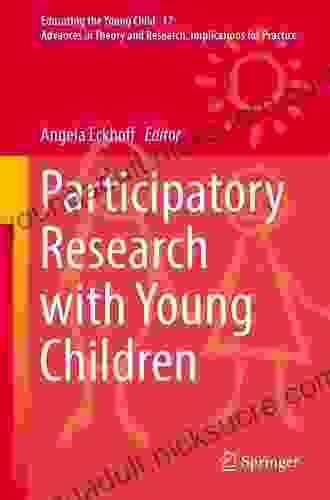Participatory Research With Young Children: Educating the Young Child 17

Participatory research is a research approach that involves children as active participants in the research process. This approach is based on the belief that children are capable of providing valuable insights into their own lives and experiences. Participatory research methods can be used to collect data on a variety of topics, including children's perspectives on their education, their experiences with poverty, and their health and well-being.
4.7 out of 5
| Language | : | English |
| File size | : | 5681 KB |
| Text-to-Speech | : | Enabled |
| Enhanced typesetting | : | Enabled |
| Word Wise | : | Enabled |
| Print length | : | 309 pages |
| Screen Reader | : | Supported |
There are many benefits to involving young children in research. First, participatory research can help to give children a voice. Children are often excluded from research studies, and their perspectives are often not taken into account. Participatory research provides a way for children to share their thoughts and feelings about the issues that affect them.
Second, participatory research can help to empower children. When children are involved in research, they learn about their rights and responsibilities. They also learn how to speak up for themselves and to advocate for their needs.
Third, participatory research can help to improve the quality of research. When children are involved in research, they can provide researchers with valuable insights that would not be available through other methods. This information can help researchers to develop more effective programs and policies for children.
There are a variety of participatory research methods that can be used with young children. Some of the most common methods include:
- Interviews: Interviews can be used to collect data on children's perspectives on a variety of topics. Interviews can be conducted individually or in groups.
- Focus groups: Focus groups can be used to collect data on children's perspectives on a specific topic. Focus groups are typically conducted with a small group of children (6-10 children).
- Observations: Observations can be used to collect data on children's behavior and interactions. Observations can be conducted in a variety of settings, such as homes, schools, and playgrounds.
- Document analysis: Document analysis can be used to collect data on children's written and drawn work. Document analysis can be used to analyze children's drawings, stories, and other written work.
When conducting participatory research with young children, it is important to keep in mind the following principles:
- Respect children's rights: Children have the right to be treated with respect and dignity. Researchers must obtain informed consent from children before involving them in research.
- Use child-friendly methods: Research methods should be adapted to the age and developmental level of the children involved. Researchers should use methods that are fun and engaging for children.
- Empower children: Children should be given opportunities to participate in all aspects of the research process. Researchers should listen to children's voices and value their perspectives.
Participatory research is a powerful tool for understanding the perspectives and experiences of young children. This approach can be used to collect data on a variety of topics, including children's perspectives on their education, their experiences with poverty, and their health and well-being. Participatory research can help to give children a voice, empower them, and improve the quality of research. When conducting participatory research with young children, it is important to keep in mind the principles of respect, child-friendly methods, and empowerment.
References
- Cammarota, J., & Fine, M. (2008). Participatory research with children and youth: Methodological and ethical dimensions. In Handbook of qualitative research in education (pp. 105-120). SAGE.
- Hart, R. (1992). Children's participation: From tokenism to citizenship. UNICEF.
- Lansdown, G. (2005). Children's rights and participatory research. Children, Youth and Environments, 15(1),1-16.
4.7 out of 5
| Language | : | English |
| File size | : | 5681 KB |
| Text-to-Speech | : | Enabled |
| Enhanced typesetting | : | Enabled |
| Word Wise | : | Enabled |
| Print length | : | 309 pages |
| Screen Reader | : | Supported |
Do you want to contribute by writing guest posts on this blog?
Please contact us and send us a resume of previous articles that you have written.
 Fiction
Fiction Non Fiction
Non Fiction Romance
Romance Mystery
Mystery Thriller
Thriller SciFi
SciFi Fantasy
Fantasy Horror
Horror Biography
Biography Selfhelp
Selfhelp Business
Business History
History Classics
Classics Poetry
Poetry Childrens
Childrens Young Adult
Young Adult Educational
Educational Cooking
Cooking Travel
Travel Lifestyle
Lifestyle Spirituality
Spirituality Health
Health Fitness
Fitness Technology
Technology Science
Science Arts
Arts Crafts
Crafts DIY
DIY Gardening
Gardening Petcare
Petcare Thomas Gilovich
Thomas Gilovich Troy A Hill
Troy A Hill Judith S Beck
Judith S Beck Robert Zubek
Robert Zubek Dennis Rainey
Dennis Rainey Angel Millar
Angel Millar Chanel Craft Tanner
Chanel Craft Tanner Mike Chambers
Mike Chambers Donna Helen Crisp Jd Msn Rn Pmhcns Bc
Donna Helen Crisp Jd Msn Rn Pmhcns Bc Leonard Lueras
Leonard Lueras Capn Fatty Goodlander
Capn Fatty Goodlander Diana Nyad
Diana Nyad Jennifer Bohnet
Jennifer Bohnet John Sonmez
John Sonmez John Geiger
John Geiger Wayne Mcghie
Wayne Mcghie Dan Ariely
Dan Ariely Stacy Mccullough
Stacy Mccullough Keith Elliot Greenberg
Keith Elliot Greenberg Louis Martin
Louis Martin Alex Wolf
Alex Wolf Dwight E Neuenschwander
Dwight E Neuenschwander K Moriyasu
K Moriyasu Madeleine Roux
Madeleine Roux Thomas Golf
Thomas Golf Richard Lee Byers
Richard Lee Byers Erin Moulton
Erin Moulton Lin Wellford
Lin Wellford Richard Lemaster
Richard Lemaster Sandy Tolan
Sandy Tolan Martin Volken
Martin Volken Judith Hoare
Judith Hoare Bradley T Erford
Bradley T Erford William E Hearn
William E Hearn Joyce Yang
Joyce Yang Jessica Jung
Jessica Jung S L Macgregor Mathers
S L Macgregor Mathers Carlo Rovelli
Carlo Rovelli Carol Ann Gillespie
Carol Ann Gillespie Samuel B Green
Samuel B Green Baby Professor
Baby Professor Robert Urban
Robert Urban Latonya J Trotter
Latonya J Trotter Mark Kernion
Mark Kernion Michael Driscoll
Michael Driscoll Rawdon Wyatt
Rawdon Wyatt Jason Hogan
Jason Hogan Violet White
Violet White William D Lopez
William D Lopez Rodney Paul
Rodney Paul Dhonielle Clayton
Dhonielle Clayton Angelo Tropea
Angelo Tropea Kelly Corrigan
Kelly Corrigan Andy Dowsett
Andy Dowsett Third Edition Kindle Edition
Third Edition Kindle Edition Lucy Postgate
Lucy Postgate Patrick M Lencioni
Patrick M Lencioni Andy Farrell
Andy Farrell Kathy Freston
Kathy Freston Rebecca Hemmings
Rebecca Hemmings Schoolhouse Heaven
Schoolhouse Heaven Dave Gray
Dave Gray Chuck Weikert
Chuck Weikert Jenna Helwig
Jenna Helwig Tina Nelson
Tina Nelson Ingrid S Clay
Ingrid S Clay David C Keehn
David C Keehn Jim Saccomano
Jim Saccomano Stephen Cheney
Stephen Cheney Nicholas Jubber
Nicholas Jubber Joshua Clark
Joshua Clark Jonah Lehrer
Jonah Lehrer Cynthia Nims
Cynthia Nims Jay Griffiths
Jay Griffiths Thais Nye Derich
Thais Nye Derich Angelo Lowery
Angelo Lowery Tristan Higbee
Tristan Higbee Peter Gibson
Peter Gibson Miles Olson
Miles Olson Sharon Strand Ellison
Sharon Strand Ellison Sam Fury
Sam Fury Eli Wilson
Eli Wilson Ron Jeffries
Ron Jeffries Jeff Fleischer
Jeff Fleischer Lisa Preston
Lisa Preston Laura Hillman
Laura Hillman Margaret Jordan Halter
Margaret Jordan Halter Miranda Green
Miranda Green Katrina Cope
Katrina Cope M J Fievre
M J Fievre Richard Hibshman
Richard Hibshman Rosie Daley
Rosie Daley Danil Zburivsky
Danil Zburivsky Ben Bleiweiss
Ben Bleiweiss Lawrence Goldstone
Lawrence Goldstone Lisa Marie Mercer
Lisa Marie Mercer Ryan D Agostino
Ryan D Agostino Tim Thayne
Tim Thayne Fredrik Backman
Fredrik Backman L S Boos
L S Boos Erich Fromm
Erich Fromm Mometrix
Mometrix Michael V Uschan
Michael V Uschan Ryan Bow
Ryan Bow Steve Hindman
Steve Hindman Lidia Bastianich
Lidia Bastianich Rod Powers
Rod Powers Patrick Pickens
Patrick Pickens Tim Hannigan
Tim Hannigan Jon Ronson
Jon Ronson Karen Elliott House
Karen Elliott House Petros Efthymiou
Petros Efthymiou Robb Manning
Robb Manning Shreya Ramachandran
Shreya Ramachandran Forrest Maready
Forrest Maready Warren St John
Warren St John Guy Evans
Guy Evans Christopher Nyerges
Christopher Nyerges Christina Reese
Christina Reese Lee Cronk
Lee Cronk Ariel Henley
Ariel Henley Ken Dryden
Ken Dryden Johnson Egonmwan
Johnson Egonmwan Jim Prime
Jim Prime Angela Smith
Angela Smith Jeremy Klaff
Jeremy Klaff Angelo Chiari
Angelo Chiari Mitch Horowitz
Mitch Horowitz Joe Peta
Joe Peta Joan Jacobs Brumberg
Joan Jacobs Brumberg Stewart Shapiro
Stewart Shapiro John B Nici
John B Nici Joy Williams
Joy Williams Alberta Hawse
Alberta Hawse Avinash Navlani
Avinash Navlani Richard L Sites
Richard L Sites Manik Joshi
Manik Joshi Tim O Connor
Tim O Connor Michael Tomasello
Michael Tomasello Rachel Hutt Phd
Rachel Hutt Phd Angela Stancar Johnson
Angela Stancar Johnson Kenneth R Ginsburg
Kenneth R Ginsburg Kristen S Kurland
Kristen S Kurland Frank Deford
Frank Deford Jodi Shabazz
Jodi Shabazz Tovar Cerulli
Tovar Cerulli Laura Bogen
Laura Bogen Stephanie Land
Stephanie Land Lindsay Ford
Lindsay Ford Mary Pipher
Mary Pipher Stuart Lawrence
Stuart Lawrence Mark Verstegen
Mark Verstegen Robin Benway
Robin Benway Patrick Ejeke
Patrick Ejeke Angela Thayer
Angela Thayer Rodney Castleden
Rodney Castleden Kari Marie Norgaard
Kari Marie Norgaard Robert Lindsay
Robert Lindsay Beth A Leonard
Beth A Leonard Mark W Steege
Mark W Steege Tiara Mcclure
Tiara Mcclure David Goodman
David Goodman Nathaniel Rich
Nathaniel Rich Kristina Statler
Kristina Statler Ruth Benedict
Ruth Benedict Jerry Toner
Jerry Toner Joel J Lerner
Joel J Lerner Dawn Griffiths
Dawn Griffiths Seth Lloyd
Seth Lloyd Kate Le Roux
Kate Le Roux W Todd Woodard
W Todd Woodard Connie Schultz
Connie Schultz Sir Edmund Hillary
Sir Edmund Hillary Ryan Beck
Ryan Beck Bradley Charbonneau
Bradley Charbonneau Rufus Estes
Rufus Estes Bob Swope
Bob Swope Brian Cain
Brian Cain Germano Dalcielo
Germano Dalcielo Lois A Ritter
Lois A Ritter Lutz Hanseroth
Lutz Hanseroth Rashaun Johnson
Rashaun Johnson Johnny Molloy
Johnny Molloy Linda Sivertsen
Linda Sivertsen Donna Mott
Donna Mott Mark Wells
Mark Wells Alessio Mangoni
Alessio Mangoni Dave Smith
Dave Smith Wynne Foster
Wynne Foster Teresa Parker
Teresa Parker Kim Foley Mackinnon
Kim Foley Mackinnon John Samuel Barnett
John Samuel Barnett Marc Charles
Marc Charles Tom Allen
Tom Allen Aaron Wilson
Aaron Wilson Michael Anthony
Michael Anthony Emily Souder
Emily Souder Paul Cobley
Paul Cobley Mtg Editorial Board
Mtg Editorial Board Rebecca P Cohen
Rebecca P Cohen Ashley Rickards
Ashley Rickards Douglas Henderson Jr
Douglas Henderson Jr Murtaza Haider
Murtaza Haider Scott Turner
Scott Turner Devaki Lakshmi
Devaki Lakshmi Angeline Boulley
Angeline Boulley Rebecca Serle
Rebecca Serle Ray Walker
Ray Walker Rebecca Eanes
Rebecca Eanes Jorge Ramos Mizael
Jorge Ramos Mizael Israelin Shockness
Israelin Shockness Richard Bate
Richard Bate Marilyn Burgos
Marilyn Burgos Caspar Melville
Caspar Melville Daddilife Books
Daddilife Books Mark Shepherd
Mark Shepherd Donald N Yates
Donald N Yates Cheryl Alkon
Cheryl Alkon Chip Heath
Chip Heath Charney Herst
Charney Herst Robyn Ryle
Robyn Ryle Catherine Mccord
Catherine Mccord Gerard Siggins
Gerard Siggins T L Payne
T L Payne Richard G Brown
Richard G Brown Bret A Moore
Bret A Moore Natalie Rhodes
Natalie Rhodes Ellen Frank
Ellen Frank Diana Winston
Diana Winston Walter Beede
Walter Beede Chef Maggie Chow
Chef Maggie Chow Tea Rozman Clark
Tea Rozman Clark George E Hein
George E Hein Chris Santella
Chris Santella Elizabeth Foss
Elizabeth Foss William Ayers
William Ayers John C Maxwell
John C Maxwell Stephen Jungmann
Stephen Jungmann Charlotte Klaar Phd
Charlotte Klaar Phd Kim Dragoner
Kim Dragoner Andy Schell
Andy Schell George Megre
George Megre Robert Dudley
Robert Dudley Joe Berardi
Joe Berardi Cap N Fatty Goodlander
Cap N Fatty Goodlander George Noory
George Noory Afra J Zomorodian
Afra J Zomorodian Christina Hillsberg
Christina Hillsberg Angelina J Steffort
Angelina J Steffort R E Burrillo
R E Burrillo Jenna Blough
Jenna Blough Mercedes Pollmeier
Mercedes Pollmeier Margaret M Quinlan
Margaret M Quinlan Ashley P Martin
Ashley P Martin Roland A Boucher
Roland A Boucher Robyn Harding
Robyn Harding Kristen Jervis Cacka
Kristen Jervis Cacka Liv Ryan
Liv Ryan James M Johnston
James M Johnston Tirzah Price
Tirzah Price Ted Sandling
Ted Sandling T R Fehrenbach
T R Fehrenbach Jessica Wolstenholm
Jessica Wolstenholm Florian Freistetter
Florian Freistetter Ellen J Langer
Ellen J Langer Muako Maepa
Muako Maepa Samir P Desai
Samir P Desai Massimo Florio
Massimo Florio Harry Fairhead
Harry Fairhead Elizabeth Hunter
Elizabeth Hunter Jules Brown
Jules Brown Jane M Healy
Jane M Healy Hajime Isayama
Hajime Isayama Frederick Aardema
Frederick Aardema Eugene P Northrop
Eugene P Northrop Karl Beecher
Karl Beecher Kevin J Gaston
Kevin J Gaston Kathy Hoopmann
Kathy Hoopmann Karen Sternheimer
Karen Sternheimer Nicole Smith
Nicole Smith Nicholas Epley
Nicholas Epley Emiko Jean
Emiko Jean Kyle Graves
Kyle Graves Mark J Musser
Mark J Musser Elly Molina
Elly Molina Sylvester Nemes
Sylvester Nemes Mark Synnott
Mark Synnott Otto Rahn
Otto Rahn Robin Yocum
Robin Yocum David E Jones
David E Jones Dave Duncan
Dave Duncan Andy Tyson
Andy Tyson Janet Menzies
Janet Menzies Gillian Price
Gillian Price Scott Alan Johnston
Scott Alan Johnston Barak Ariel
Barak Ariel Dan Heath
Dan Heath D M Davis
D M Davis Eric Schmitz
Eric Schmitz Daniel Friedmann
Daniel Friedmann Greg Prato
Greg Prato Christopher O Kennon
Christopher O Kennon Donald R Prothero
Donald R Prothero Yuu Tanaka
Yuu Tanaka Judea Pearl
Judea Pearl Mark Rosenman
Mark Rosenman Robert Kirk
Robert Kirk Robert E Stake
Robert E Stake Angela Eckhoff
Angela Eckhoff Emily Nielson
Emily Nielson Stephen Rea
Stephen Rea Jay Matthews
Jay Matthews Joseph Mazur
Joseph Mazur Andrea Lankford
Andrea Lankford Shenila Khoja Moolji
Shenila Khoja Moolji Neveen Musa
Neveen Musa Neil Hawkesford
Neil Hawkesford Nikki Ace
Nikki Ace Rob Willson
Rob Willson Sabbithry Persad Mba
Sabbithry Persad Mba G K Derosa
G K Derosa Warren Sande
Warren Sande Tara Sim
Tara Sim Gregory J Davenport
Gregory J Davenport Oliver Burkeman
Oliver Burkeman Rebecca Solnit
Rebecca Solnit Derek M Steinbacher
Derek M Steinbacher Shane O Mara
Shane O Mara Tigran Bagdasaryan
Tigran Bagdasaryan Yvonne Choquet Bruhat
Yvonne Choquet Bruhat Howell Raines
Howell Raines Elizabeth Kaledin
Elizabeth Kaledin William Bryant Logan
William Bryant Logan Andy Mitchell
Andy Mitchell Andy Jurinko
Andy Jurinko Keylee C Hargis
Keylee C Hargis David Graeber
David Graeber Viviana Altuve
Viviana Altuve Andy Peloquin
Andy Peloquin Deborah Wall
Deborah Wall Rafael Gordillo Naranjo
Rafael Gordillo Naranjo Rick Vaive
Rick Vaive Adam Skolnick
Adam Skolnick Jamie Kuykendall
Jamie Kuykendall Stefan Hunziker
Stefan Hunziker Emma Dalton
Emma Dalton Wendy Rosenoff
Wendy Rosenoff Tovah Feldshuh
Tovah Feldshuh Chris Chelios
Chris Chelios Barry Pickthall
Barry Pickthall Jenny Smith
Jenny Smith Dean Beaumont
Dean Beaumont Tom Chatfield
Tom Chatfield David Kinney
David Kinney Marie Brennan
Marie Brennan Tom Dymond
Tom Dymond Peter Townsend
Peter Townsend Raynor Winn
Raynor Winn Matt Vincent
Matt Vincent Mandee Heller Adler
Mandee Heller Adler Ben Ehrenreich
Ben Ehrenreich Mirabai Starr
Mirabai Starr Cory Mortensen
Cory Mortensen Christian Heath
Christian Heath Stephen Grossberg
Stephen Grossberg Ruby Lang
Ruby Lang Mark Remy
Mark Remy Kent David Kelly
Kent David Kelly Kim West
Kim West Rebecca Boggs Roberts
Rebecca Boggs Roberts Bernd Heinrich
Bernd Heinrich Peter Finch
Peter Finch United States Government Us Army
United States Government Us Army Tanya Lee Stone
Tanya Lee Stone Pete Dunne
Pete Dunne Andy Puddicombe
Andy Puddicombe Mark Lester
Mark Lester Caryl Say
Caryl Say Howard Davis
Howard Davis Margaret Visser
Margaret Visser Kevin Hunter
Kevin Hunter Ron Douglas
Ron Douglas Jessica Nordell
Jessica Nordell Kevin Thomas
Kevin Thomas Jeffrey Thurston
Jeffrey Thurston Sandra Steingraber
Sandra Steingraber Angela C Wu
Angela C Wu Jo May
Jo May Julia Reed
Julia Reed Jordan Summers
Jordan Summers Jodi Picoult
Jodi Picoult Phil Burt
Phil Burt J D Swanson
J D Swanson Robyn Wideman
Robyn Wideman Lynn Lyons
Lynn Lyons Jeanne Godfrey
Jeanne Godfrey Eliot Schrefer
Eliot Schrefer Milton Roth
Milton Roth Scott Meyer
Scott Meyer Stefanie K Johnson
Stefanie K Johnson Serena B Miller
Serena B Miller Dr Eva Beaulieu
Dr Eva Beaulieu Carlos Acevedo
Carlos Acevedo Ed Stafford
Ed Stafford Kat Anderson
Kat Anderson Karl E Peace
Karl E Peace Susan Burton
Susan Burton Matthew D Dewar
Matthew D Dewar Meg Long
Meg Long Belinda Norton
Belinda Norton Keith Crowley
Keith Crowley Gary B Meisner
Gary B Meisner Irene Gut Opdyke
Irene Gut Opdyke Richard A Muller
Richard A Muller Christian Wiggins
Christian Wiggins Jeffrey T Richelson
Jeffrey T Richelson Pete Sampras
Pete Sampras Sam Bleakley
Sam Bleakley Tania N Shah
Tania N Shah Nicholas D Kristof
Nicholas D Kristof Jeff Mach
Jeff Mach David Herres
David Herres Andy Crowe
Andy Crowe Bob Gordon
Bob Gordon Marie Myung Ok Lee
Marie Myung Ok Lee Stephen Lynch
Stephen Lynch Scott Stillman
Scott Stillman Leanne Ely
Leanne Ely Angel Burns
Angel Burns Jim Posewitz
Jim Posewitz Nick Bradley
Nick Bradley Michele Borba
Michele Borba Tim Larkin
Tim Larkin Roger Craig
Roger Craig Siena Cherson Siegel
Siena Cherson Siegel Kathryn Miles
Kathryn Miles Tj Faultz
Tj Faultz Jeffrey Bernstein
Jeffrey Bernstein Harold S Koplewicz
Harold S Koplewicz Jonathan Gottschall
Jonathan Gottschall Madison Lee
Madison Lee Cate Tiernan
Cate Tiernan George Johnson
George Johnson Hourly History
Hourly History Jeffrey Lee
Jeffrey Lee Rachel Kowert
Rachel Kowert Humberto G Garcia
Humberto G Garcia Colby Coombs
Colby Coombs James Quinn
James Quinn Ben Campbell
Ben Campbell Shalabh Aggarwal
Shalabh Aggarwal Tim Macwelch
Tim Macwelch Robin Ray Green
Robin Ray Green Bob Clouser
Bob Clouser Lynn Palm
Lynn Palm Arlin Smith
Arlin Smith Angela Leslee
Angela Leslee Rachel Connelly
Rachel Connelly Joseph Phillips
Joseph Phillips Bill Schneider
Bill Schneider Anna Rashbrook
Anna Rashbrook
Light bulbAdvertise smarter! Our strategic ad space ensures maximum exposure. Reserve your spot today!
 Denzel HayesFollow ·5.7k
Denzel HayesFollow ·5.7k Zachary CoxFollow ·16k
Zachary CoxFollow ·16k Mark MitchellFollow ·6.3k
Mark MitchellFollow ·6.3k August HayesFollow ·11.2k
August HayesFollow ·11.2k Oscar BellFollow ·2.8k
Oscar BellFollow ·2.8k Mitch FosterFollow ·5.3k
Mitch FosterFollow ·5.3k Edwin BlairFollow ·16.6k
Edwin BlairFollow ·16.6k Noah BlairFollow ·7.5k
Noah BlairFollow ·7.5k

 Devon Mitchell
Devon MitchellDelve into the Comprehensive World of Cartridges: A...
In the realm of firearms, cartridges stand...

 Joseph Conrad
Joseph ConradTales From The San Francisco 49ers Sideline: A Look...
The San Francisco 49ers are one of the most...

 Ervin Bell
Ervin BellArcGIS Desktop 10: A Comprehensive GIS Tutorial for...
Geographic information...

 Reed Mitchell
Reed MitchellPhysiology Pretest Self Assessment And Review 14th...
Accurately gauge your physiology knowledge and...

 Devin Ross
Devin RossLost At Sea: The Unbelievable True Story of the Jon...
In 2009, journalist Jon Ronson set out to...

 Shane Blair
Shane BlairModes of Thinking for Qualitative Data Analysis
Qualitative data analysis is a complex...
4.7 out of 5
| Language | : | English |
| File size | : | 5681 KB |
| Text-to-Speech | : | Enabled |
| Enhanced typesetting | : | Enabled |
| Word Wise | : | Enabled |
| Print length | : | 309 pages |
| Screen Reader | : | Supported |












